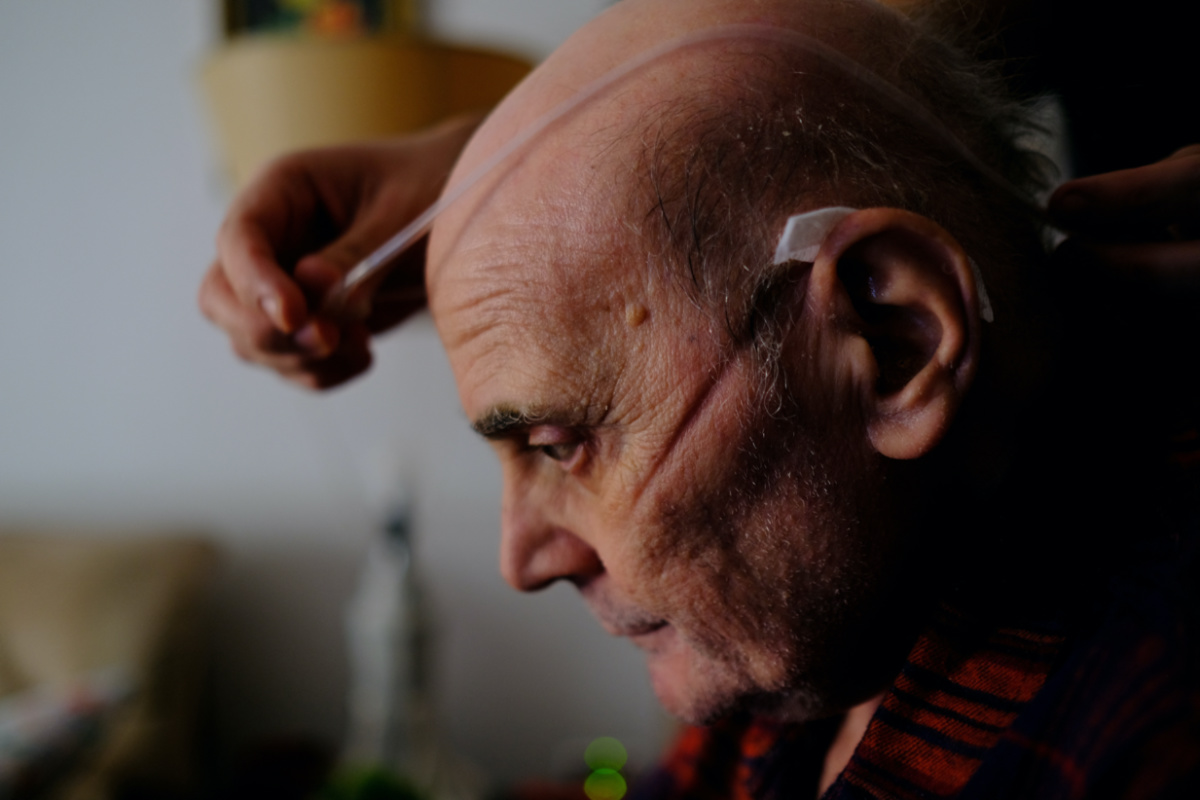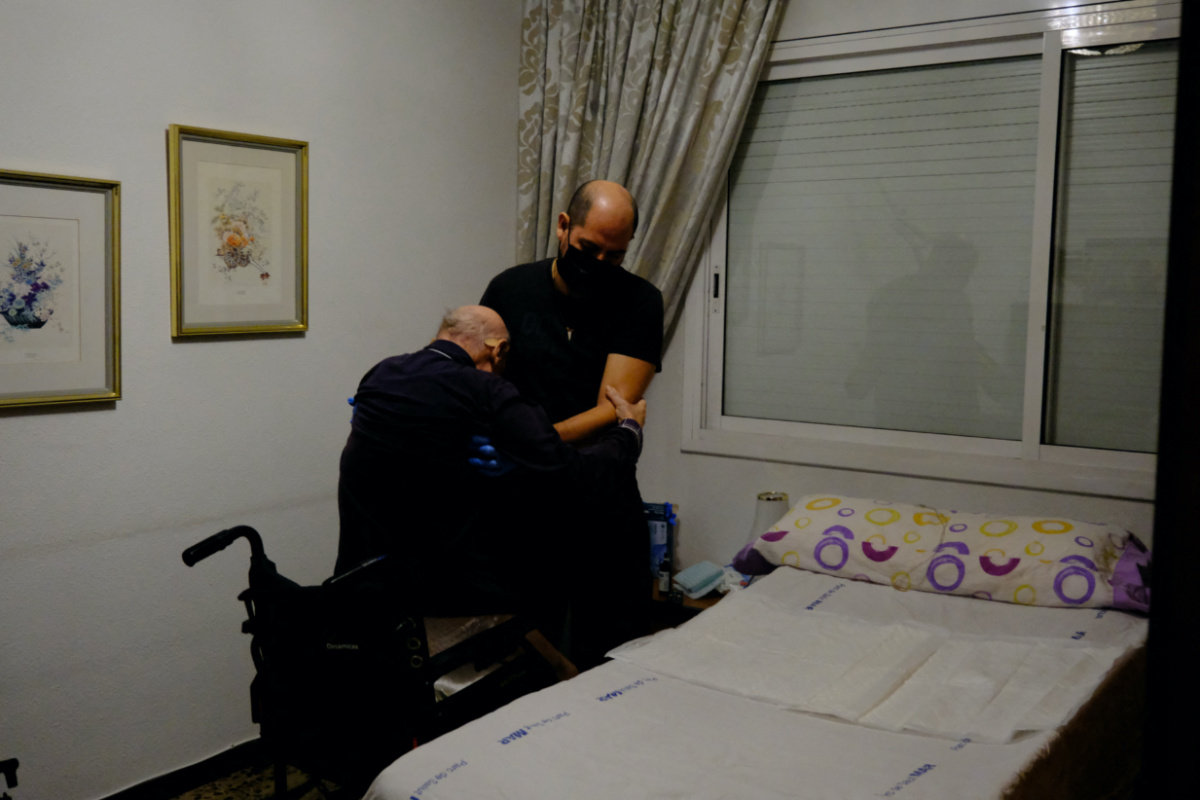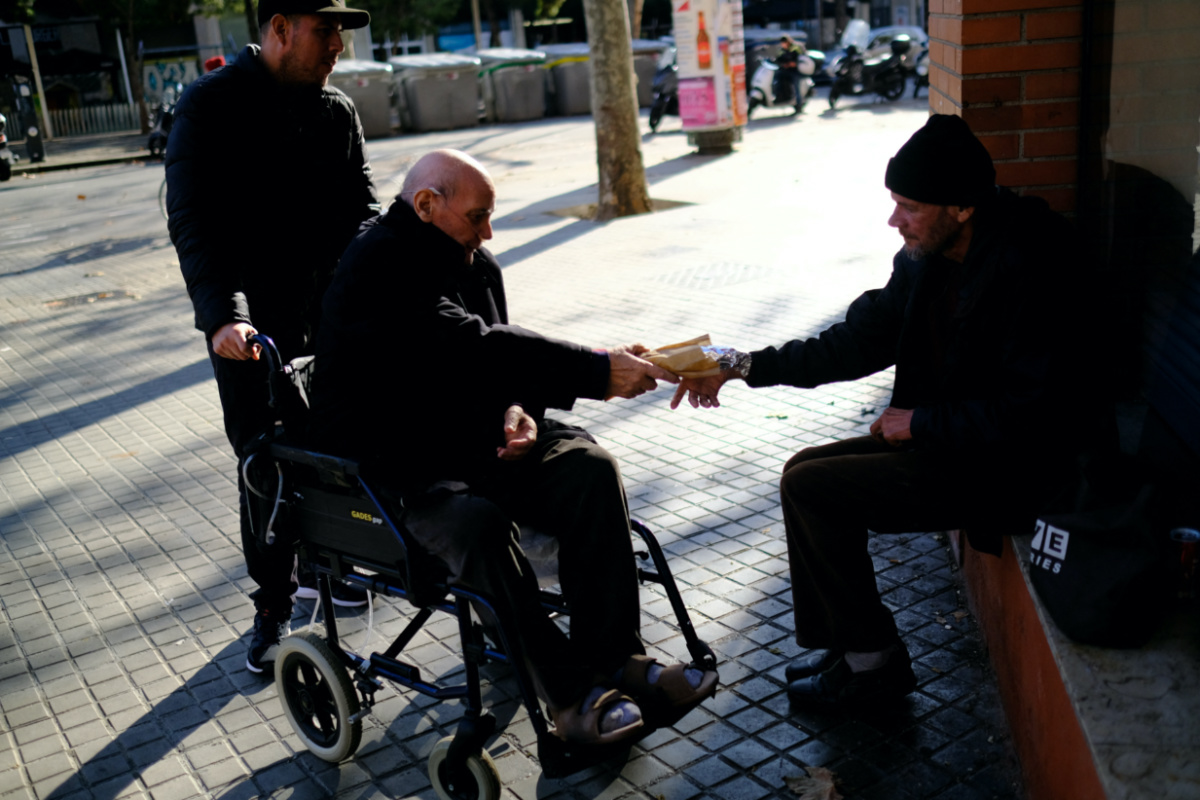
NACHO DOCE and HORACI GARCIA, of Reuters, report on the impacts higher power prices are having on some of the most vulnerable…
Madrid, Spain
Reuters
Jose Maria Casais’ €2,700-a-month income from a pension and incapacity benefits ought to leave him better off than most of his fellow Spaniards.
But Casais, a retired engineer living in Barcelona, says he is being forced to raid his savings every month after his energy bills soared because of his reliance on an oxygen machine to alleviate his chronic obstructive pulmonary disease (COPD).

An imprint of a nasal cannula is seen on the face of Jose Maria Casais, 69, who uses a portable oxygen concentrator respiratory machine to breathe, while he is helped by his carer Alvaro, 40, to dress in his house in Barcelona, Spain, on 14th December, 2022. PICTURE: Reuters/Nacho Doce
For the past two years, Casais has been plugged into the oxygen concentrator for up to 24 hours a day. His electricity bill has almost tripled since Russia invaded Ukraine in February, he says, triggering an energy crisis in Europe because of its dependence on Russian gas. He’s part of a middle class in Spain being dragged into poverty by the crisis. Nearly four per cent of Spanish households in the fourth income decile – a segment typically viewed as middle class – have spent more than half of their income on energy since the rise in prices last year, an Oxfam survey found.
Whereas before the energy crisis nearly half of households in Spain had the capacity to save, Oxfam estimates that now only three in 10 households can do so.
“It limits everything else; leaves no option for other things.”
– Pensioner Jose Maria Casais
Casais spends between €300 and €400 a month on energy – about triple what he spent before the crisis – leaving little or nothing for other essentials after his other medical expenses, which include a live-in carer. By mid-month, he has to start drawing on his savings, he said.
“It limits everything else; leaves no option for other things,” Casais, a former engineer at the state-run rail company Renfe, told Reuters in his Barcelona apartment.
Casais’ oxygen concentrator pulls air through a compressor, removing nitrogen and filtering oxygen to deliver to the patient. Depending on how much difficulty Casais has breathing on a given day, he will be connected between 17 and 24 hours.
He is not alone. An estimated five million people in Spain suffer from COPD, said Dr. Sergi Pascual, pulmonology unit coordinator at the Hospital del Mar in Barcelona. It’s the third largest cause of death worldwide and the fourth in Spain, the Spanish Association for Patients with COPD (APEPOC) says.

Alvaro, 40, a caregiver, helps his client Jose Maria Casais, 69, get into his bed, in Barcelona, Spain on 21st December, 2022. PICTURE: ReutersNacho Doce
Patients in other countries are also suffering. A survey of more than 3,600 people with lung conditions by the charity Asthma + Lung UK found that one in five Britons surveyed with asthma reported life-threatening attacks as they cut back on medicines, heating and food because of the soaring cost of living.
Sufferers of other maladies such as kidney failure dependent on electricity-guzzling machines to survive are also struggling, two medical groups representing kidney disease say.
Without his oxygen machine, Casais said he would have to be permanently hooked up to a machine in hospital, losing his independence and costing the state more.
COPD is “a chronic, irreversible disease,” Pascual said, “so these patients’ objective is to live a useful and full life and they therefore need the necessary funds”.
It’s not only oxygen machines that rack up bills. Pulmonary disease sufferers must carefully regulate their homes’ ambient temperature, which means relying on air conditioning in Spain’s searing summers and central heating in its brisk winters.
“If the weather suddenly changes from good to a rainy day you feel terrible,” Casais said. “The cold affects your breathing.”
Fernando Uceta, 61, who had a double lung transplant in August and also suffers from COPD, says he avoids air conditioning and relies on easier-to-monitor electric heaters to manage his costs.
“There’s an energy poverty that some call the invisible version, which is where people do what I do: put on less heating and not use air conditioning. Or people turn off their oxygen machine and don’t receive the amount they need,” Uceta said.

Alvaro, 40, a caregiver, pushes the wheelchair of his client Jose Maria Casais, 69, who uses a portable oxygen concentrator backpack with a battery to breathe, as he gives a sandwich to Enrique, who is a homeless, on a street near Casais’s house in Barcelona, Spain, on 14th December, 2022. Reuters/Nacho Doce
Many electricity-dependent Spaniards are facing some stark choices, said Nicole Hass, a spokesperson for APEPOC: “With this rise in electricity prices they have to decide between eating and breathing.”
APEPOC wants Spain’s local governments to subsidise energy bills for all COPD sufferers, regardless of their income.
Spain’s national health service covers the cost of oxygen but not of electricity, Hass said. “What use is the oxygen if we don’t have the electricity to plug in the machine?”
We rely on our readers to fund Sight's work - become a financial supporter today!
For more information, head to our Subscriber's page.
APEPOC wants Spain to emulate countries like Argentina, which in 2017 made electricity free for electricity-dependent individuals. In New Zealand, electricity retailers are obliged by law to provide discounts for so-called medically dependent consumers.
Health policy in Spain is determined by its 17 autonomous regions. An initiative last year by Catalan party Esquerra Republicana to include patients dependent on medical devices in a list of vulnerable consumers who receive help with their energy bills stalled in the national parliament.
In response to Reuters questions, Catalonia’s health ministry pointed to a protocol approved by the regional government in 2020 that guarantees no-one has their electricity cut off. The measure does not offer subsidies to help patients with high bills.
Casais has already altered his diet to cut costs. He now lives on one-euro packets of processed meats and tins of tuna. He’s now considering remortgaging his apartment to cover his medical and energy costs.
“They should give a direct discount on electricity bills to everyone who is electricity-dependent regardless of their income or where they live,” he said.






